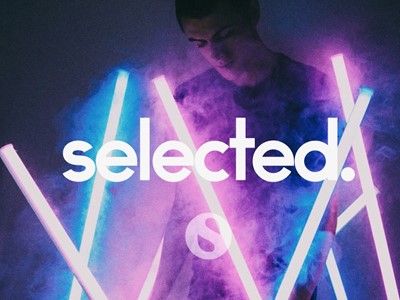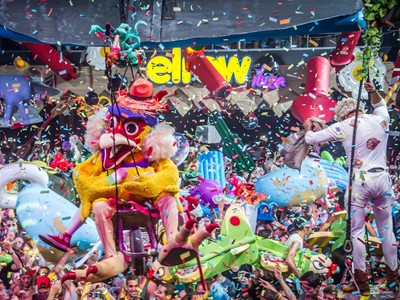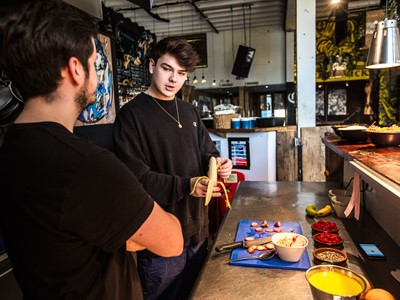Managing Editor
We sat down with the National Treasure to talk about her life, her love of music and almost being kettled the day she got the MBE.
It's not everyday you meet a bona fide national treasure, let alone get to spend an hour in conversation with one. A few weeks ago I was lucky enough to sit down with Annie Nightingale in the Ministry Radio studio - a fitting location for the first female DJ on Radio One (and its longest serving broadcaster). I don't usually get nervous before interviews, but I have to admit I was a little daunted by the prospect of interviewing someone who's been in the music industry (not to mention the interview game) for such a long time. I knew that my interview techniques and music knowledge would pale in comparison to hers, I was just praying I didn't come across as too amateur.
Thankfully I needn't have worried, Annie is quite possibly one of the friendliest, most down-to-earth and genuinely fascinating people I've ever met (never mind interviewed). We had a long chat about her sincere passion for music peppered with anecdotes from her illustrious career. With 50 years of broadcasting there was a lot to cover, but here are some of the highlights.
Annie also talked in detail about her three disc Masterpiece compilation she's been working on with us over the past few months.
MoS: How did you first get into music?
I grew up with music; my dad played music all the time at home and I was very affected by it. I was very affected by violins; I couldn’t listen to violins. I would burst into tears – still do, actually. That’s why I like things like Ferry Corsten's "Adagio For Strings" remix [Laughs] – make it loud and happy, because I’m very, very emotionally affected by music. I think that’s probably why I’ve ended up doing what I do, because it does; it affects me.
Did you ever dream of becoming a musician?
I suppose I would love to have been a musician, but my coordination is not good, which does not make life easy for a DJ either, between left and right hand. I had piano lessons when I was a kid, I was in the school choir; I couldn’t sing very well, but I was incredibly drawn to it. I knew it was just something that I had to be involved somehow.
Is that how you discovered you had a passion for Radio?
You know when you hear a new piece of music and you phone your friend and go, “I want to play this down the phone to you.” That actually is what doing a radio show is. It hasn’t changed that much; it’s still voice, microphone, comes out the other end and a way of playing it to somebody else. Often it’s to say, “What do you think? Do you like this as well? Am I crazy? Is this just something that only I like?” I want to know what other people think and if they share my enthusiasm. That is all; that’s it really.
Do you remember the first record that you played on radio?
The first record I played on Radio One was "Oh Well" by Fleetwood Mac. Unfortunately, it’s not on this compilation [Laughs]... I tired!
What’s been the biggest change in the music industry from your perspective?
Massive changes! Obviously, first of all, the way you listen to music. How did it go? Vinyl, cassettes, CDs, MP3, so that’s four huge changes, massive changes but before MP3 you would have to go and buy it from somewhere, so you’d go to a record shop.
Do you miss going to record stores and buying your music?
I did like the camaraderie in record shops. There was one I used to go to in Paris. I was very into French dance music and on a previous compilation I put Daft Punk on it before they were signed, so that’s my other claim to fame!
Do you feel that different genres of music is more accessible today?
Now it’s so much easier for people to make their own music; they can put it on SoundCloud, they can get it out there. They don’t have to have a big record deal like they used to, so that music is everywhere. The problem is where do you find what you like? There’s almost too much.
One of the constants throughout your career has been radio. Why do you think that radio is still so vital, despite the influx of alternative ways to find music?
I don’t know why radio has stayed with us, possibly because of this curation thing, because there is so much music everywhere you look. It's nice to know there’s an area that you can trust or an area where they’ll find and play new music that you'll like. I think that’s got to be the only reason. It is extraordinary; who would have thought that it would survive? It reflects the changes of the times, and that’s very important. It’s got to be ahead of the game all the time. I mean I listen to what 13-year-olds listen to because that’s the future.
What advice would you give someone who’s looking to get into radio today?
To radio? Just be utterly… You need to be utterly passionate about music. After 7pm DJs are specialists, they play their own music, and choose all their own music. That's what I do and always have done, so that to me is the value of it. If I couldn’t choose the music I played, I wouldn’t want to do it at all.
You were obviously the first female DJ on Radio One. Do you think that there are more women in radio now; do you think that it’s changed, and do you think there’s more that could be done?
I know this is going to sound like, “She would say that, wouldn’t she?” but I have to say Radio One in the last few years has been brilliant the way it has helped to get far more women on air - daytime, as well as specialist programmes. I think there are more female DJs on Radio One than there has ever been.
You still have a weekly show on 1Xtra, what does it mean to you?
I am very deeply honoured, actually, because that’s cutting-edge music and that’s very young music. That’s where the industry music is coming from. It’s also where the presenters are coming from, where the new DJs are coming from.
I'm pretty sure you're the first person I've interviewed with an MBE, certainly the first DJ anyway. What was that like?
I didn’t really know whether it was something that I was pro or not, and so I asked John Peel. He was a great person to kind of say, “John, can I have a quiet word with you? I want to ask you
something confidential.” I said, “Look, I’ve had this letter,” which you think is from the tax people or something. It was horrible and it turns out it’s been a letter from… I think it comes from 10
Downing Street, saying, “We will offer you this thing.” I told him I didn't know what to do about it, and he went, “Well, take it, because otherwise, if I hadn’t” – I think he had the OBE – “if I
hadn’t, I might be sitting in a pub one day thinking, ‘I got offered one of those and I didn’t take it.’" He said, "It’s a day out.”
Did you have a good day out in the end?
Well, my day out was amazing! You have to get to the palace really early in the morning, and I decided we had to turn it into a party day, so we went to some posh hotel first, had a little get together, and then had a party at the Social Club just off Oxford Street. It was 1st May, which was a traditional day of protest the whole of the West End of London converged on Oxford Circus and the police started kettling people. It’s the first time I’d had any experience of that. Basically they herd people into an area that they can’t escape from. They keep them there and stop them, I suppose they think, from making any further trouble. They keep them contained in a small space, like sheep in a pen – I mean really exactly like that. I’d never seen anything like this before.
Suddenly, Great Portland Street, where this venue was where I was having this party, there was a whole street covered in police with riot shields and police horses, and you couldn’t get around. I had this amazing driver from Montenegro, who said, “We will get there somehow,” and he was like a tank driver; he was determined we were going to get there.
Then Radio One said, “Right, the party is off, cancelled.” I went, “I can’t do that; I can’t. All these people are coming from all over the place.” We had people coming from LA, and Paris, and across London and wherever. I said, “I can’t get in touch with them all now to cancel it,” so we had to get people in, open the door, push them down the stairs, shouting, “Get inside; get inside quick so you don’t get kettled!” There were people who decided to go out and have a look, they got kettled by the police and weren’t allowed back in! So the MBE day was a riot, literally!
What was your fondest musical memory?
I’ve got so many, lots, and lots, and lots: seeing ‘8 Mile’. ‘Lose Yourself’, by Eminem, which is not on this compilation, unfortunately, remains to me a really inspirational track – you’ve got one chance, one opportunity. I went to see that film in LA, in Hollywood, probably on my own, because I just felt it’s such an important film to see as it’s about overcoming odds, overcoming difficulty, and I think he’s an incredible role model in various ways. I’m a huge Eminem fan.
That’s what my next question was going to be, was: is there anyone that you want to meet that you haven’t?
Eminem I would love to meet, probably the main one. Rhianna, actually, I’d love to meet... I would like to meet Rhianna.
Annie's Masterpiece is out now. Get your copy here.










